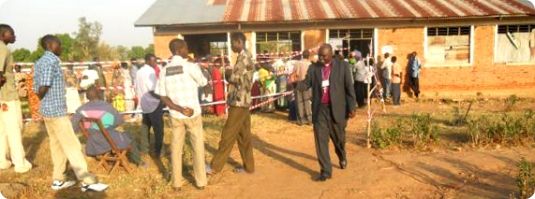Welcoming Refugees Home to Africa’s Newest Country

The Rt. Rev. Alapayo Manyang Kuctiel is the bishop of the Diocese of Rumbek, a small diocese in the middle of Southern Sudan. Bishop Alapayo, as he is known, is the Chair of SUDRA (the Sudanese Development and Relief Agency) and a long-time friend of Episcopal Relief & Development. A highly respected bishop in the Episcopal Church of Sudan (ECS), Bishop Alapayo has headed up a number of efforts around the January referendum on independence for Southern Sudan. These included the provision of shelter and supplies for returning refugees and internally-displaced people (IDPs), and civic education workshops in archdeaconries around his diocese.
January’s historic referendum was the culmination of the Comprehensive Peace Agreement (CPA) that marked the official end of the Sudanese civil war in 2005. The war had been ongoing since 1955, except for a period of relative calm from 1972-83, and resulted in the deaths of 2 million people and the displacement of 4 million, mainly from the South. Families fleeing the violence ended up in the camps of Khartoum, Kenya and Uganda, or emigrated to places like Australia and the US. After the signing of the CPA, people started returning to their homes – and even more in the weeks preceding the referendum vote. This massive influx of people, some of whom had been away for years or even decades, created challenges in the communities where they were being re-absorbed. Some arrived back in their homelands with only a few possessions and the limited supplies they were able to collect from relief agencies. Many were in need of additional assistance.
Responding to this need in Rumbek, Bishop Alapayo worked with local government to secure a few acres of land where returnees could set up camp. The land was cleared, and people began to settle there in the weeks before the referendum. As an additional service to those who returned, SUDRA provided tools and seeds to help people start to work the land and grow food for themselves and their families. This is an extension of an existing program supported by Episcopal Relief & Development, which provides tools, materials and training to communities of returning refugees throughout the South.
“The Sudanese have been incredibly resilient throughout this transition period, building communities back from scratch, after being away so long,” said Janette O’Neill, Program Officer for Episcopal Relief & Development. “Our partnership with SUDRA is focused on helping people meet their basic needs as they seek to re-establish homes and a new life in their former homeland.”
SUDRA is also helping the Diocese of Rumbek provide emergency supplies to those in need. According to Bishop Alapayo, the number of people seeking assistance from the diocese rose from 360 to 2,630 in the three weeks preceding the referendum, necessitating a much larger response than the diocese could muster by itself. Now, the diocese is providing maize flour, beans and cooking oil to 530 households, in addition to such items as blankets and sleeping mats, plastic sheeting, water containers and kitchen utensils.
This response to the immediate needs of returning refugees comes on top of the work the diocese had been doing to prepare community members for the vote on independence. Dioceses throughout the ECS led civic education workshops to explain the process of voting, the importance of participating and the meaning of the possible outcomes of the referendum. In Rumbek, instead of holding workshops in one central location, a mobile team of educators traveled to each archdeaconry, talking with potential voters.
“While it is not possible to measure the impact of the Episcopal Church of Sudan’s outreach on voter turnout,” O’Neill says, “the size of the Church and the fact that it is such a core part of civil society in the South means that it has great potential influence. I think everyone is very proud of how the vote went, and in general very pleased with the outcome. Episcopal Relief & Development is honored to be supporting the work of SUDRA and the dioceses of the ECS through this exciting and challenging time.”


